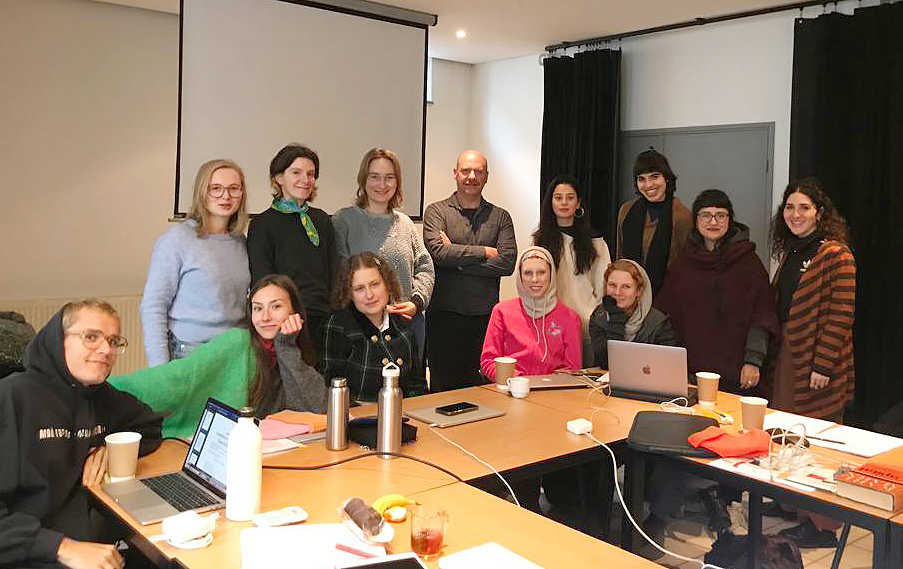A Fabric Instead of a Lecture ~ From Month to Month
The seminar is tutored by: Dr. Grant Watson
Participants second year: Adriana A. Leanza, Mara Ittel, Ros del Olmo + Theresa Zwerschke
Participants first year: Anastasia Nefedova, Antoine Schalk, Gamze Öztürk, Gloria Sogl, Rex Collins, Tereza Dvořáková, Valeria Moro, Zoé Couppé.
Seminar 2 (February 2023) online
This seminar focuses on Rosemary Hennessy’s Fires on the Border which takes up questions of labour and community organising in the textile factories in Mexico. This text zooms in on the conditions and struggles of workers in textile industries, which requires both heavy industry and repetitive manual labour, mostly undertaken by women. Hennessy’s ideas intersect gender and queer theory with Marxist analysis to explore how the abjection and feminisation of women and gay men become the tools for hyper-exploitation in the factory system as well as tools of resistance to it. Working through interviews, Hennessy’s text moves between social theory and worker’s testimony. A central question is whether the concept of bio–deregulation is able to describe the contemporaneous exploitation of feminised bodies in the production process, and the deregulation of sexual norms, which have allowed delimited freedom for sexual minorities. This project challenges the mystifications and divisions present in a globalised economy, between queer consumers in the north and producers in the Global South, and it points to the possibilities for solidarity. The seminar includes a screening of “Towards a Queer Marxism: A Roundtable Discussion” which helps to locate Hennessy’s book in the context of Queer Marxist thinking.
Readings:
Hennessy, Rosemary. Fires on the Border: The Passionate Politics of Labour Organising on the Mexican Fronter. Minneapolis: University of Minnesota Press, 2013. Chapter 5 “The Value of Second Skins,” and chapter 6 “Feeling Bodies, Jeans, Justice.”
“Towards a Queer Marxism: A Roundtable Discussion,” Youtube, user: Haymarket Books, 15 December 2022. https://www.youtube.com/watch?v=YiGmMunNVFs.
Seminar 1 (November 2022) in Arnhem
This seminar addresses the emergence of capitalism, the colonial system, and the transfer of wealth from the Global South to Europe through the extraction of raw materials, enslavement and the subjugation of colonies. Sven Beckert’s Empire of Cotton takes the story of cotton to unpack this history, describing how over a period of 200 years, the cotton trade, the most profitable global commodity at that time, was transformed through the violent projection of capital. This echoes Marx and his account of how colonialism went hand in hand with the industrial revolution in Europe and the development of a factory system, establishing capitalism as a worldwide phenomenon. In tandem Late Victorian Holocaust by Mike Davis reveals how the devastating impacts of the El Niño were magnified by colonial rule and the re-structuring of textile production in India. A podcast with Nancy Fraser brings these discussions to the present through a consideration of primitive accumulation (or accumulation through dispossession) as not only a historical process but one that continues and intensifies in the present.
Reading:
Sven Beckert. Empire of Cotton. London: Penguin Books, 2015. Chapter Two, Building War Capitalism, 29–55.
Friedrich Engels, Condition of the Working Class in England. “Introduction,” 33 – 41. https://www.marxists.org/archive/marx/works/download/pdf/condition-working-class-england.pdf
Mike Davis. Late Victorian Holocausts. Chapter Ten “India: The Modernization of Poverty,” 311–317. https://textz.com/textz/Late%20Victorian%20Holocausts.pdf.
Additional reading:
Karl Marx, Capital Volume 1, Part XXVI. “The So-Called Primitive Accumulation,” 507–509 and 533–535. https://www.marxists.org/archive/marx/works/download/pdf/Capital-Volume-I.pdf.
“How Capitalism Works with Nancy Fraser,” the Dig (podcast), 17 July 2022. https://thedigradio.com/podcast/how-capitalism-works-w-nancy-fraser/.


